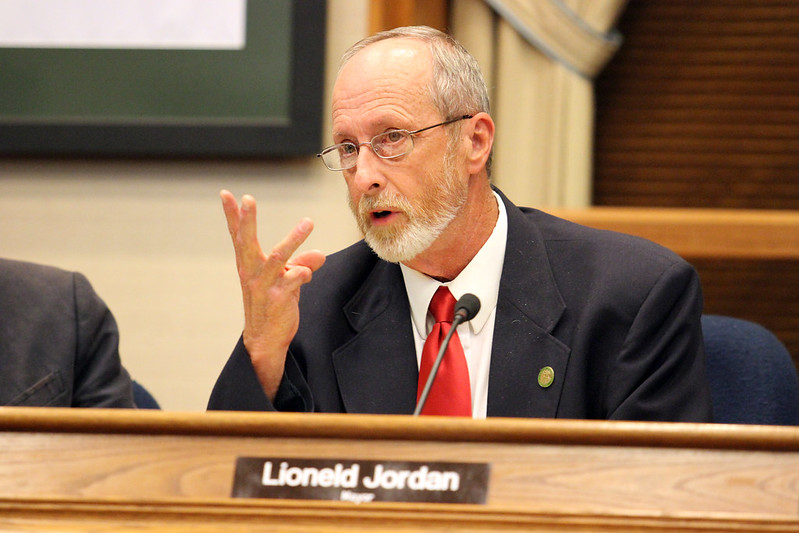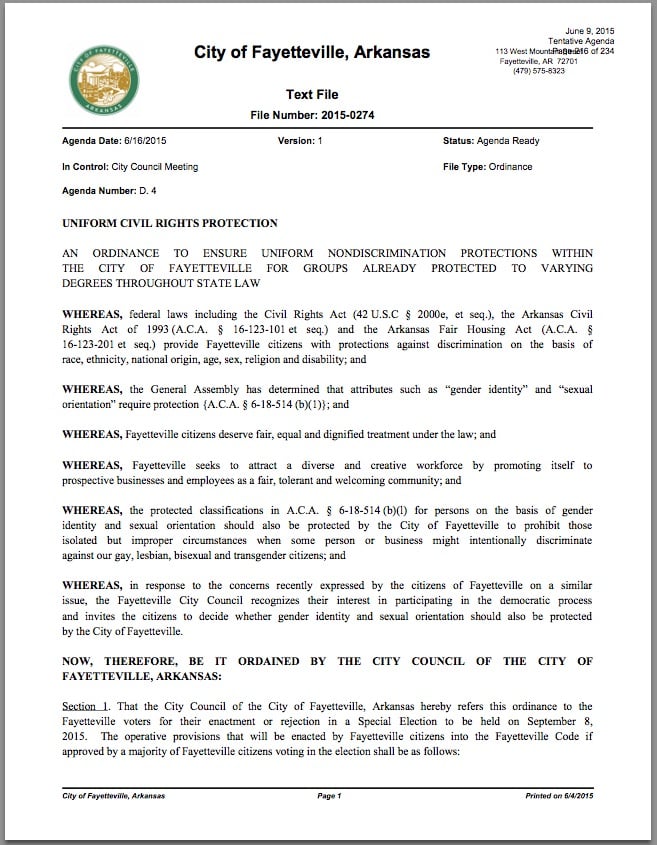
Fayetteville Mayor Lioneld Jordan speaks during the Aug. 19-20 City Council meeting before aldermen voted to approve a contentious civil rights protection ordinance.
Photo: Todd Gill, Flyer staff
As promised, Mayor Lioneld Jordan has set his rules of conduct for the June 16 City Council meeting.
Jordan last week said he anticipates another large turnout from residents who will want to speak about a proposed new civil rights protection ordinance up for discussion at Tuesday evening’s meeting. He said the rules are intended to ensure that every interested citizen will have time to speak and to establish order and a process to advance the public’s participation.
The rules are:
- Citizens of Fayetteville will be allowed to speak first.
- Participants must give their name and address at the microphone.
- Each person will have one turn at the microphone unless asked to return by a council member.
- There will be a three-minute maximum length of time; Chief of Staff Don Marr will run the timer.
- All remarks must be directed to Mayor Lioneld Jordan; no remarks may be directed to aldermen and no personal attacks will be allowed.
- All will behave in a respectful and courteous manner.
Additionally, Jordan plans to announce the following information regarding occupancy regulations for City Hall during the meeting:
In order to ensure the public’s right to assemble, and provide for the public safety during an assembly, there are occupancy limits in each area and room of this building required by law. The number of people allowed in each area is a formula in the fire code based on the size of the room and is not an arbitrary number. I ask that you follow the instructions of the fire marshals and police officers in the building who will direct you to overflow rooms that have been provided for your convenience. Keep in mind that when you leave any room that has reached its occupancy limit, the next person in line has the right to take your place. If they do take your place, then you cannot be allowed back in until another person leaves. People outside of the chamber who want to speak on an issue can form a single line just outside the chamber door. Fayetteville residents will speak first. Once you have made your remarks, you must leave the chamber unless addressed by an alderman. Thank you for your cooperation.
Jordan set similar rules during the Aug. 19-20 meeting before a vote on the Civil Rights Administration Ordinance, including a three-minute individual time limit after several residents spoke for nearly 20 minutes each. Residents filled the council chambers that night, and were lined up through the halls of the City Administration Building and down the sidewalks waiting for a chance to speak during the public comment portion of the meeting, which lasted nearly 10 hours.
Uniform Civil Rights Protection Ordinance
The Uniform Civil Rights Protection Ordinance was proposed by Alderwoman Adella Gray and Alderman Matthew Petty to replace the Civil Rights Administration Ordinance, which was adopted in August 2014 and narrowly repealed by voters in December.
The new law would prohibit business owners and landlords from firing or evicting someone because of their sexual orientation or gender identity. It would also provide protections for use of public accommodations, such as restrooms.
If passed, the ordinance would not go into effect unless voters approve the measure in a special election to be held Sept. 8.
Churches, religious schools and daycare facilities, and religious organizations of any kind would be exempt from the new law.
Unlike the previous civil rights ordinance that was approved by aldermen and then later repealed, the city attorney would not serve as the administrator of complaints. Instead, a Civil Rights Commission would be formed to review and decide complaints of alleged discrimination.
The commission would consist of seven members: two representatives of the business community; two owners or managers of rental property; one representative with experience in human resources or employment law; and two citizens at large, at least one of whom identifies as lesbian, gay, bisexual, or transgender.
Anyone asserting a claim of discrimination would be required to present their claim in writing to the city attorney, who would inform the Civil Rights Commission that a complaint had been received.
Informal and confidential mediation would be attempted by the city before any other enforcement measures could begin. If mediation fails, the commission would schedule a hearing to review the complaint and receive evidence. If the commission determines that discrimination had occurred, the violator would be fined up to $100 for the first offense. Subsequent violations would carry the city’s general penalty which calls for fines of up to $500. A violation would not be considered a misdemeanor or felony.


